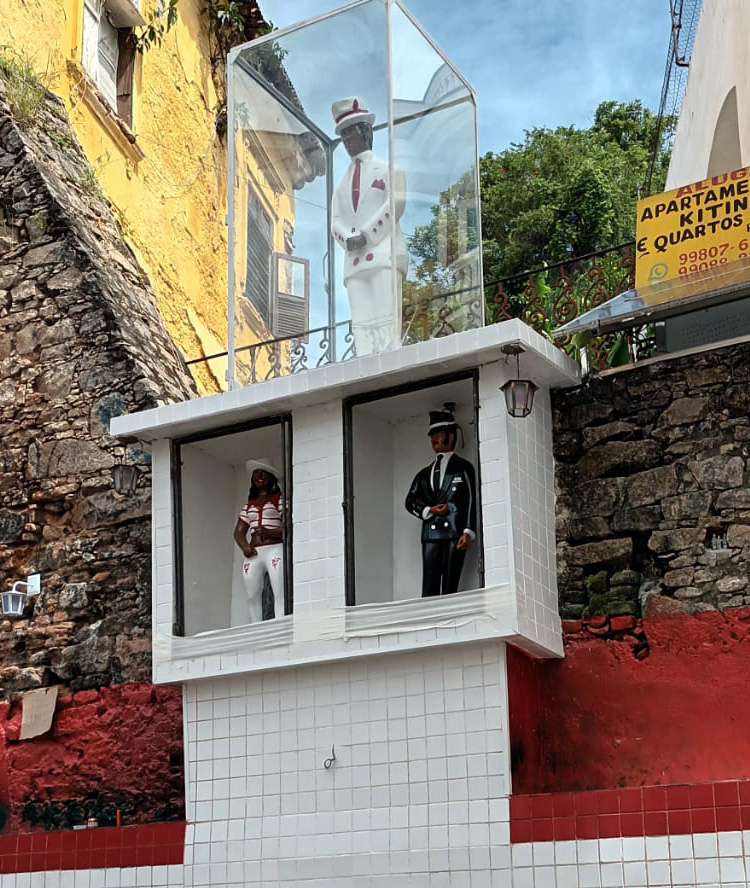Difference between revisions of "Zé Pilintra"
Occultwiki (talk | contribs) (Created page with "400px|thumb|Typical depiction of Zé Pelintra '''Zé Pelintra''' or '''Zé Pilintra''' is one of the most important entities among several African...") |
Occultwiki (talk | contribs) |
||
| (2 intermediate revisions by the same user not shown) | |||
| Line 2: | Line 2: | ||
'''Zé Pelintra''' or '''Zé Pilintra''' is one of the most important entities among several [[African diaspora religion|Afro-Brazilian religions]]. He is considered the patron [[saint]] of bars, poor people, and street hustlers. Although not aligned with negative entities, Zé Pelintra is the embodiment of a "rogue" archetype. | '''Zé Pelintra''' or '''Zé Pilintra''' is one of the most important entities among several [[African diaspora religion|Afro-Brazilian religions]]. He is considered the patron [[saint]] of bars, poor people, and street hustlers. Although not aligned with negative entities, Zé Pelintra is the embodiment of a "rogue" archetype. | ||
Although reverence for him originated from the | Although reverence for him originated from the Catimbó tradition in the Northeast Region of Brazil, devotion to him has spread throughout Brazil after he was incorporated into [[Umbanda]]. | ||
==Description== | ==Description== | ||
| Line 18: | Line 18: | ||
==Origin stories== | ==Origin stories== | ||
There is debate among scholars and followers of Afro-Brazilian religions as to whether the Zé Pelintra of | There is debate among scholars and followers of Afro-Brazilian religions as to whether the Zé Pelintra of Catimbó is the same spirit as worshipped in [[Umbanda]], although the majority of Brazilians view the differences between traditions as inconsequential to their beliefs. | ||
There are multiple oral traditions concerning the origin of Zé Pelintra, and legends vary widely depending on the geographic region in Brazil. | There are multiple oral traditions concerning the origin of Zé Pelintra, and legends vary widely depending on the geographic region in Brazil. | ||
| Line 35: | Line 35: | ||
==Abilities== | ==Abilities== | ||
[[File:Zé Pilintra Shrine.jpg|400px|thumb|Shrine to Zé Pilintra in Rio]] | |||
Zé Pelintra is invoked when his followers need help with domestic, business or financial matters and is reputed as a worker of charity and good works. | Zé Pelintra is invoked when his followers need help with domestic, business or financial matters and is reputed as a worker of charity and good works. | ||
In both [[Umbanda]] and | In both [[Umbanda]] and Catimbó, Zé Pelintra is considered the protector of the destitute in general, having earned the nickname ''Advogado dos Pobres'' (Lawyer of the Poor), due to the spiritual and material patronage he exercises. | ||
Perhaps most widely, he is invoked as the father of the “Brazilian way." A kind of cunning trickster figure, a master of street-smarts that the Brazilian people inherited from enslaved African that continues to help them survive discrimination and racism. | Perhaps most widely, he is invoked as the father of the “Brazilian way." A kind of cunning trickster figure, a master of street-smarts that the Brazilian people inherited from enslaved African that continues to help them survive discrimination and racism. | ||
==Distribution of believers | ==Distribution of believers== | ||
Zé Pilintra's most fervent devotees live in large urban centers, such as Rio de Janeiro and São Paulo | Zé Pilintra's most fervent devotees live in large urban centers, such as Rio de Janeiro and São Paulo where he is especially revered by practitioners of the three primary Afro-Brazilian religions: | ||
* [[Quimbanda]] | |||
* [[Umbanda]] | |||
* [[Candomblé]] | |||
Devotion to him is popular outside of Afro-Brazilian traditions, with many Brazilians viewing him as an unofficial [[saint|patron saint]] of Brazil. This is especially true in the northeast, where his origin stories are still predominate as folk tales. | |||
==Legacy== | ==Legacy== | ||
Latest revision as of 16:35, 19 November 2024
Zé Pelintra or Zé Pilintra is one of the most important entities among several Afro-Brazilian religions. He is considered the patron saint of bars, poor people, and street hustlers. Although not aligned with negative entities, Zé Pelintra is the embodiment of a "rogue" archetype.
Although reverence for him originated from the Catimbó tradition in the Northeast Region of Brazil, devotion to him has spread throughout Brazil after he was incorporated into Umbanda.
Description
In the most typical depiction of Zé Pelintra, he is dressed in a white linen suit with a maroon or red tie, a Panama hat, and white, two-tone shoes. His style is reminiscent of the zoot suits worn by African Americans and Latinos in the 1930s and 1940s.
In the Jurema tradition in Brazil's far northeast, he is depicted wearing a simple white or checkered shirt with rolled up sleeves, a straw hat, and white pants rolled up at the legs, without shoes and with a scarf around his neck in red or other colors, carrying a cane and pipe.
Personality
Zé Pilintra is the epitome of a good Brazilian: smooth, irreverent, witty, and full of swing. As a good scoundrel, he enjoys going from bar to bar, playing at card tables, or drinking fine alcohol in the shadows of the crossroads where street prostitutes (his primary companions) are working.
His patronage of the destitute and outcasts makes him similar to Latin America's Santa Muerte and Hecate in the religion of ancient Greece.
Iconography
Zé Pelintra is typically smoking a cigarette, drinking alcohol, or holding playing cards.
Origin stories
There is debate among scholars and followers of Afro-Brazilian religions as to whether the Zé Pelintra of Catimbó is the same spirit as worshipped in Umbanda, although the majority of Brazilians view the differences between traditions as inconsequential to their beliefs.
There are multiple oral traditions concerning the origin of Zé Pelintra, and legends vary widely depending on the geographic region in Brazil.
Morro de Santa Teresa
One legend says that Zé was born in Morro de Santa Teresa. This man was a powerful [[channeling|medium] and master of techniques used in Jurema, including shifting between the world of the living and the dead.
Pernambuco
Another legend says that Zé was known as José Gomes da Silva, who was born in the interior of Pernambuco. Silva was a strong and agile black man who enjoyed gambling and drinking and never shied away from a fight. Full of skills with a razor and a fish knife, no one dared to challenge him. Even the police respected his reputation. However, he had a good heart and was extremely flirtatious, treating women like true queens.
Exu
Another story says he was born as José dos Anjos in the town of Bodocó, near the municipality of Exu, in the hinterlands of Pernambuco. One year to escape a terrible drought, the Anjos Family traveled to the city of Recife. Upon arrival, three-year-old José lost his mother and was raised by the city's criminals. He began sleeping on the docks of the port and became an errand boy for prostitutes. José grew into a tall, strong, and respected man who protected and managed the various criminal enterprises in the city. At the age of 41, he was mysteriously found dead without any signs of injury.
Non-human entity
In other traditions, Zé was never a living person, but is the corporeal form of a collection of scoundrel entities collectively called malandros.
Abilities
Zé Pelintra is invoked when his followers need help with domestic, business or financial matters and is reputed as a worker of charity and good works.
In both Umbanda and Catimbó, Zé Pelintra is considered the protector of the destitute in general, having earned the nickname Advogado dos Pobres (Lawyer of the Poor), due to the spiritual and material patronage he exercises.
Perhaps most widely, he is invoked as the father of the “Brazilian way." A kind of cunning trickster figure, a master of street-smarts that the Brazilian people inherited from enslaved African that continues to help them survive discrimination and racism.
Distribution of believers
Zé Pilintra's most fervent devotees live in large urban centers, such as Rio de Janeiro and São Paulo where he is especially revered by practitioners of the three primary Afro-Brazilian religions:
Devotion to him is popular outside of Afro-Brazilian traditions, with many Brazilians viewing him as an unofficial patron saint of Brazil. This is especially true in the northeast, where his origin stories are still predominate as folk tales.
Legacy
Musician and composer Itamar Assumpção wrote a song about Zé Pelintra in 1988, in partnership with Waly Salomão, entitled Zé Pilintra.
In 2005, he was honored in the samba-enredo of the samba school Unidos de Cosmos, in the chorus that says "my drum will echo, good night, Zé Pelintra, I have faith, I will exalt you." This samba began to be sung every year before the start of the school's parade, as well as in festivities in the quadra.
In 2022, Rio de Janeiro councilman Átila Alexandre Nunes Pereira created a bill so that July 7th would be celebrated as Zé Pelintra Day.
Zé Pelintra is heavily referenced in the 2014 rap song Convoque seu Buda by Brazilian singer Criolo.

